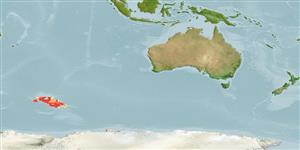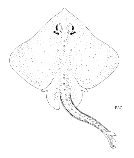Ajouter votre observation dans Fish Watcher
| Native range | All suitable habitat | Point map | Year 2050 |

|
| This map was computer-generated and has not yet been reviewed. |
| Bathyraja murrayi AquaMaps Data sources: GBIF OBIS |
Envoyez vos Photos et vidéos
Pictures | Images GoogleBathyraja murrayi
Female picture by FAO
Pictures | Images GoogleBathyraja murrayi
Female picture by FAO
Common names from other countries
Classification / Names Noms communs | Synonymes | Catalog of Fishes(Genre, Espèce) | ITIS | CoL | WoRMS | Cloffa
Élasmobranches (requins et raies) (sharks and rays) > Rajiformes (Skates and rays) > Arhynchobatidae (Softnose skates)
Etymology: Bathyraja: Greek, bathys = deep + Latin, raja, -ae = a ray (Raja sp) (Ref. 45335).
Eponymy: Sir John Murray (1841–1914) was a Canadian marine naturalist often described as the founder of modern oceanography. [...] (Ref. 128868), visit book page.
More on author: Günther.
Etymology: Bathyraja: Greek, bathys = deep + Latin, raja, -ae = a ray (Raja sp) (Ref. 45335).
Eponymy: Sir John Murray (1841–1914) was a Canadian marine naturalist often described as the founder of modern oceanography. [...] (Ref. 128868), visit book page.
More on author: Günther.
Environment: milieu / climate zone / depth range / distribution range Écologie
marin démersal; profondeur ? - 800 m (Ref. 11892), usually 20 - 200 m (Ref. 11892). Polar; 48°S - 54°S, 63°E - 79°E
Distribution Pays | Zones FAO | Écosystèmes | Occurrences | Point map | Introductions | Faunafri
Southern Ocean: considered endemic to the Kerguelen Plateau (Ref. 5159).
Taille / Poids / Âge
Maturity: Lm ? range ? - ? cm
Max length : 60.0 cm TL mâle / non sexé; (Ref. )
Max length : 60.0 cm TL mâle / non sexé; (Ref. )
Oviparous. Distinct pairing with embrace. Young may tend to follow large objects, such as their mother (Ref. 205). Eggs are oblong capsules with stiff pointed horns at the corners deposited in sandy or muddy flats (Ref. 205). Egg capsules are 6.0 cm long and 3.4 cm wide (Ref. 41249). Frequently taken in commercial bottom hauls but not much utilized because of its small size (Ref. 5159).
Life cycle and mating behavior Maturité | Reproduction | Frai | Œufs | Fécondité | Larves
Oviparous, paired eggs are laid. Embryos feed solely on yolk (Ref. 50449). Distinct pairing with embrace. Young may tend to follow large objects, such as their mother (Ref. 205). Eggs have horn-like projections on the shell (Ref. 205).
Référence principale
Upload your references | Références | Coordinateur : McEachran, John | Collaborateurs
McEachran, J.D. and K.A. Dunn, 1998. Phylogenetic analysis of skates, a morphologically conservative clade of elasmobranchs (Chondrichthyes: Rajidae). Copeia 1998(2):271-290. (Ref. 27314)
Statut dans la liste rouge de l'IUCN (Ref. 130435: Version 2024-1)
Préoccupation mineure (LC) ; Date assessed: 20 November 2019
Menace pour l'homme
Harmless
Utilisations par l'homme
Pêcheries: intérêt commercial mineur
FAO(pêcheries: production; publication : search) | FishSource | Sea Around Us
Plus d'informations
Trophic ecology
Éléments du régime alimentaire
Composition du régime alimentaire
Consommation alimentaire
Food rations
Prédateurs
Éléments du régime alimentaire
Composition du régime alimentaire
Consommation alimentaire
Food rations
Prédateurs
Population dynamics
Paramètres de croissance
Max. ages / sizes
Length-weight rel.
Length-length rel.
Fréquences de longueurs
Mass conversion
Recrutement
Abondance
Paramètres de croissance
Max. ages / sizes
Length-weight rel.
Length-length rel.
Fréquences de longueurs
Mass conversion
Recrutement
Abondance
Life cycle
Reproduction
Maturité
Fécondité
Frai
Spawning aggregations
Œufs
Développement de l'œuf
Larves
Dynamique des populations larvaires
Reproduction
Maturité
Fécondité
Frai
Spawning aggregations
Œufs
Développement de l'œuf
Larves
Dynamique des populations larvaires
Anatomy
Surface branchiale
Brain
Otolith
Surface branchiale
Brain
Otolith
Physiology
Body composition
Nutrients
Consommation d'oxygène
Type de nage
Vitesse de nage
Visual pigments
Fish sound
Diseases & Parasites
Toxicity (LC50s)
Body composition
Nutrients
Consommation d'oxygène
Type de nage
Vitesse de nage
Visual pigments
Fish sound
Diseases & Parasites
Toxicity (LC50s)
Genetics
Génétique
Heterozygosity
Héritabilité
Génétique
Heterozygosity
Héritabilité
Human related
Aquaculture systems
Profils d'aquaculture
Souches
Ciguatera cases
Stamps, coins, misc.
Aquaculture systems
Profils d'aquaculture
Souches
Ciguatera cases
Stamps, coins, misc.
Outils
E-book | Guide de terrain | Générateur de fréquences de longueur | Outil de dynamique de population | Carte par point | Classification Tree
| Catch-MSY |
Articles particuliers
Télécharger en XML
Sources Internet
Aquatic Commons | BHL | Cloffa | Websites from users | FishWatcher | CISTI | Catalog of Fishes(Genre, Espèce) | DiscoverLife | ECOTOX | Faunafri | Fishtrace | GenBank(génôme, nucléotide) | GloBI | GOBASE | | Google Books | Google Scholar | Google | IGFA World Record | MitoFish | Otolith Atlas of Taiwan Fishes | PubMed | Reef Life Survey | Scirus | SeaLifeBase | Arbre de Vie | Wikipedia(aller à, chercher) | World Records Freshwater Fishing | Zoological Record
Estimates based on models
Preferred temperature (Ref. 115969): 1.6 - 3.9, mean 3 (based on 42 cells).
Phylogenetic diversity index (Ref. 82804): PD50 = 0.5000 [Uniqueness, from 0.5 = low to 2.0 = high].
Bayesian length-weight: a=0.00550 (0.00291 - 0.01038), b=3.13 (2.97 - 3.29), in cm Total Length, based on LWR estimates for this Genus-body shape (Ref. 93245).
Niveau trophique (Ref. 69278): 3.9 ±0.7 se; based on size and trophs of closest relatives
Résilience (Ref. 120179): Faible, temps minimum de doublement de population : 4,5 à 14 années (Fec assumed to be <100).
Fishing Vulnerability (Ref. 59153): Moderate vulnerability (44 of 100).
Climate Vulnerability (Ref. 125649): High to very high vulnerability (73 of 100).




